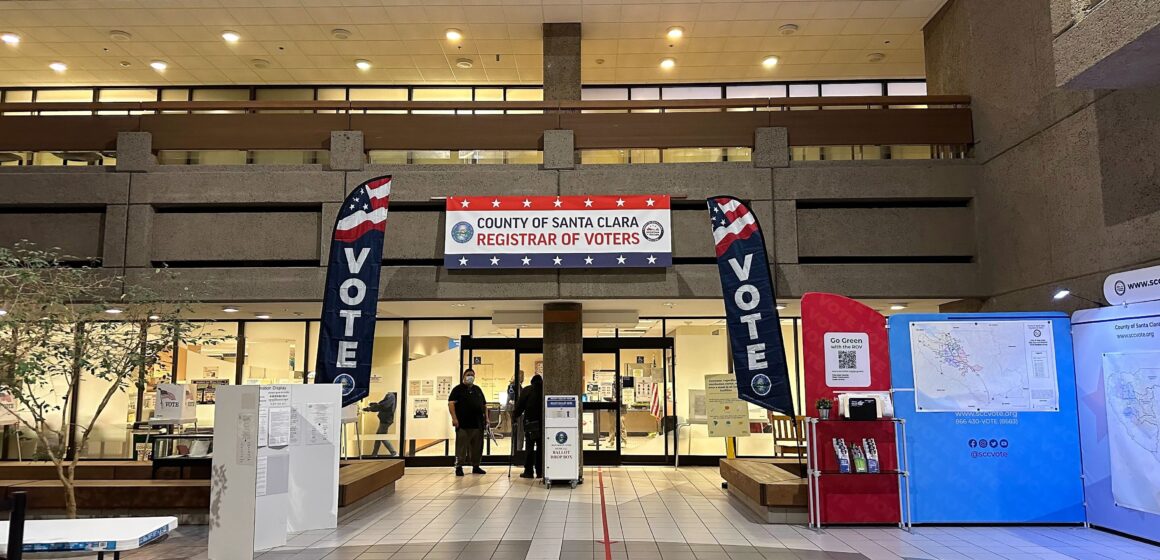A growing field of candidates has raised hundreds of thousands of dollars in the four-month sprint to the November special election for Santa Clara County assessor.
The official list of candidates to become the county’s chief property taxer — affecting everything from housing development to public school funding — won’t be finalized until the nomination period closes Friday. Yet candidates are already meeting massive war chest benchmarks due to a mix of factors — and breathing a collective sigh of relief after San Jose Councilmember Pam Foley ruled out a run for the office.
Foley said she plans to finish the remainder of her council term despite some supporters encouraging her to step into the race.
“A lot of people encouraged me — and I thought about it,” Foley told San José Spotlight. “But frankly I don’t want to leave my City Council position a year early. I want to remain focused on the city of San Jose.”
For months retirement rumors had been circling that former Assessor Larry Stone, 84, was calling it quits. He left office in July after 30 years on the job. That shifted the focus from 2026 — when some expected to challenge his reelection — to a much sooner Nov. 4 special election. Candidates face an incredibly short runway for a position they’ll hold for just a year before having to mount a reelection bid for a full term.
Official campaign finance filings as of June 30 showed Saratoga Councilmember Yan Zhao, who has been fundraising for an assessor campaign since 2023, had raised about $450,000. Zhao said she’s since then crossed the $500,000 mark. The disclosures also show Zhao has spent more than $15,000 as of June 30.
Los Altos Vice Mayor Neysa Fligor, an assistant assessor who Stone has endorsed in the race, had raised more than $66,000 as of June 30, and spent roughly $3,000. She has since announced raising more than $100,000. Rishi Kumar, a tech executive and former Saratoga councilmember, announced his candidacy July 30 but has yet to report any fundraising.
“The community has responded to my campaign for a more responsible, accountable and efficient Assessor’s Office,” Zhao told San José Spotlight. “I feel pretty good and confident that people are supporting me because they can see what I can bring to the office. A change is needed. That’s why I joined this race.”
Fligor, a certified property tax appraiser who helped Stone’s office overhaul its outdated computer system this year, said she’s the only candidate who has the sufficient qualifications to be an assessor on day one.
“It’s very technical and specialized, so folks who have never done the work may think, ‘Maybe I’ll be good at it.’ But I can actually say that I like this work,” Fligor told San José Spotlight. “The fact that someone who has been doing the job for 30 years has endorsed me says a lot.”
Zhao holds a residential appraiser license and has completed required trainings to become a certified property tax appraiser, which is required of assessor’s office employees, according to documents she provided.
Kumar, CEO of EthosAI, said he does not have his certified appraiser license.
“But let’s be clear — the Assessor’s Office already employs many certified appraisers, and the elected Assessor has a full year to earn certification. public service is his calling,” Kumar told San José Spotlight.
He said public service is his calling.
“Voters aren’t electing an appraiser. They’re electing a reformer who’s ready on day one to modernize, restore trust, and unlock billions for our community,” he said.
Whoever emerges victorious from the November election — with a possible Dec. 30 runoff if needed — could be a major influence over the region through the remainder of Stone’s term, which ends December 2026.
Not only do school districts reliant on property tax revenue have a stake. So do tech companies and speculative housing investors in a region where property values have seen their lowest growth in more than a decade due to economic uncertainty, vacancies and stalled development.
Still, the total net assessed value of all real estate and personal property — known as the assessment roll — reached a new height of nearly $726 billion, according to Stone’s final assessment roll released this year. Home sales increased by 3% and accounted for 86% of roll growth.
 Both Kumar and Fligor have voiced a desire to improve customer service at the assessor’s office. Kumar said he plans to introduce public-facing dashboards to increase transparency around assessment timelines.
Both Kumar and Fligor have voiced a desire to improve customer service at the assessor’s office. Kumar said he plans to introduce public-facing dashboards to increase transparency around assessment timelines.
“The Assessor’s Office has $120 billion tied up in appeals—delayed by outdated technology, poor morale, and failed leadership. Legacy COBOL systems still run core functions and upgrade hasn’t happened for decades,” he said. “A recent FGOC audit confirmed major issues. And a 2022 County Employee Pulse Survey ranked the office in the bottom 5% of all departments.”
Fligor said one of her overarching priorities is educating residents on what the assessor’s office actually does.
“Many people don’t know what we do,” Filgor said. “We’re not passing policies. All 58 assessor’s offices throughout the state are governed by the same state laws. We just enforce it. If we don’t have these priorities in place, we’re putting schools, cities and special districts at risk.”
Zhao said she wants to establish educational outreach programs to help residents understand how to use the office.
“I want this office to be a resource for people,” she said.
Contact Brandon Pho at [email protected] or @brandonphooo on X.



Leave a Reply
You must be logged in to post a comment.